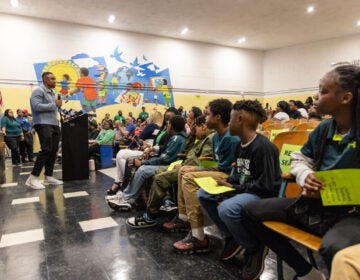Nutter proposes extra $105 million annually for Philadelphia schools
Between Gov. Tom Wolf’s proposed state budget and Mayor Michael Nutter’s proposal, the School District of Philadelphia could realize a revenue bump of $289 million next year.
Here’s the math: $159 million in basic education and special education funding from the state, plus $25 million in savings from charter funding reform plus $105 million from Nutter’s proposed budget.
That’s nearly enough to hit the district’s $309 million funding goal. But the state and city funding increases are contingent upon lawmakers agreeing to different and, in some cases, more taxes.
The mayor’s budget plan depends on a 9.34 percent increase to city property taxes, a move likely to be unpopular in an election year and coming on the heels of property tax hikes in 2010 and 2011. Nutter, however, said only about 30 percent of property owners actually saw an increase to their tax bills when the Actual Value Initiative rolled out in 2011.
Councilwoman Jannie Blackwell, a supporter of traditional public schools, said while she supports Wolf’s budget plan, local support for increasing taxation is a big fat “none.”
Nutter argued that Wolf’s proposed property tax cuts at the state level would offset the proposed hike to local property taxes in the year 2017.
Moved to emotion at several points during his final budget address as mayor, Nutter said, “I don’t want to raise your taxes. But I do want to educate our children.”
Philly’s contribution to schools over time
During the 2000s, city contributions for the Philadelphia School District rose in tandem with the state’s funding. Under Gov. Tom Corbett, however, the state cut back its stake in funding Philadelphia schools, and the city scrambled to contribute more.
Increasing property taxes, sales tax and the cigarette tax all bumped up the city’s contribution. As Nutter acknowledged in his address, over the last five years City Council invested “more than $360 million annual recurring funding in public education — the largest five-year increase in local contribution … over the last 30 years.”
Even so, many cities nationwide contribute more proportionally to their school districts than Philadelphia does.
Not everyone agrees that means the city should be spending even more. According to Council President Darrell Clarke, “If there’s a shortfall in funding, it’s the state.”
Wolf’s proposed budget would restore $1 billion to the state’s education funding cut under Corbett, including reinstating a charter reimbursement payment to defray heavy costs incurred by the district when students leave for charter schools.
Clarke, who said he supports Wolf’s budget, wants City Council to have more input on district spending before agreeing to more funding.
As for the property tax, Clarke said financial challenges shouldn’t mean “sticking your hands in the taxpayers’ pockets.”
Funding the Action Plan
A few weeks ago, district Superintendent William Hite sent Clarke and Nutter letters detailing the $103 million request from the district to enact the District’s Action Plan 3.0, released yesterday. Hite, along with former SRC chair and current commissioner Bill Green and other members of the district’s leadership, attended the budget address.
The mayor’s budget delivers on that ask — and then some — bringing in $105 million in recurring revenue.
Clarke was less eager to fulfill the district’s request for funds. “It’s consistent with what’s happened over the last several years … I said they will be back again, and here they are.”
With reduced funding from the state in recent years, the district cut school and administrative staff, including nurses and guidance counselors. But without any additional funding, it faces an $80 million deficit for the next school year.
With the mayor’s budget, that structural deficit would go away. “That’s something exciting in and of itself,” said Hite.
Nutter saidhis budget is the only way to put the district on a path toward financial stability. To those who say the district keeps asking for more, he answers that’s because it’s done without for too long.
“The reason they have to come back, year after year after year, is none of us combined have given them what they actually ask for,” said Nutter. “They’re asking for what they asked for in the first place and didn’t get.”
WHYY is your source for fact-based, in-depth journalism and information. As a nonprofit organization, we rely on financial support from readers like you. Please give today.




